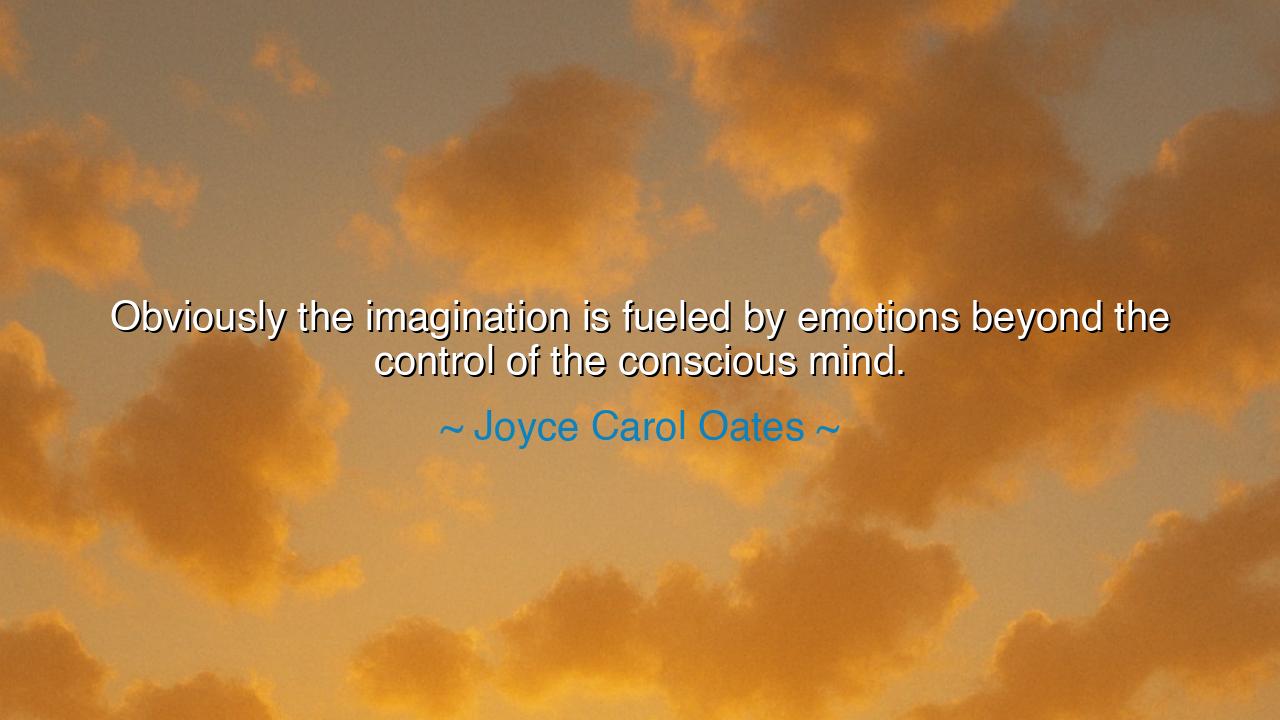
Obviously the imagination is fueled by emotions beyond the
Obviously the imagination is fueled by emotions beyond the control of the conscious mind.






"Obviously the imagination is fueled by emotions beyond the control of the conscious mind." These words, uttered by the gifted Joyce Carol Oates, strike at the very core of human nature. The imagination, that sacred vessel of creation, is often regarded as a product of reason and thought, yet Oates reveals a deeper truth: it is not the intellect alone that gives rise to our imaginings. No, it is the emotions, those wild, untamable forces within us, that stir the imagination and propel it into realms where reason dares not venture. They move through us like a torrent, unseen and unpredictable, shaping the images and visions that appear in our minds. These emotions, beyond the reach of the conscious mind, transcend the boundaries of rational thought, guiding us in ways that we cannot fully comprehend or control.
Consider, if you will, the mighty force of the unconscious mind, which Oates suggests governs much of our creative impulses. It is an ancient force, as old as humanity itself, dwelling beneath the surface of our awareness. The conscious mind may hold sway over the rational and the deliberate, but the unconscious is a river of wild dreams, fears, desires, and passions, flowing unchecked and unbidden. It is from this river that the greatest works of art, literature, and invention often spring. Imagination, when fed by the emotions, takes flight on the wings of these untamed currents, soaring beyond the confines of what we think we know, to the edges of what we dare to dream.
Consider the life of Vincent van Gogh, whose work was driven not by cold calculation, but by the searing passions of his heart. His paintings, so full of color and intensity, were born from the deep turmoil of his soul. Van Gogh’s imagination was not shaped by conscious design, but by the ebb and flow of his emotions, his pain, his longing, his ecstasy, and his despair. His now-famous swirls of color, his vivid landscapes, were not the result of careful planning but of an outpouring of feeling that transcended thought itself. His emotions guided his brush in a dance of wild creation, defying the rigid structure of the mind. This, then, is the power of the unconscious—that it gives rise to art that speaks to the deepest parts of the human experience, transcending reason and logic to speak directly to the soul.
In this truth lies a lesson for us all: that we are not mere creatures of thought, bound by the chains of logic and reason, but beings of emotion, capable of creating with a force that transcends the limits of our conscious understanding. How often do we suppress our feelings, fearing that they will lead us astray or cause us to lose control? Yet it is precisely in surrendering to these feelings, in allowing them to flow freely, that we unlock the true power of our imagination. To repress them is to stifle the very essence of our creativity, to dam the river that carries our most profound insights.
Let us look also to Shakespeare, whose works echo the depths of the human condition. His tragedies, comedies, and histories are all infused with a rawness that speaks not to the calculated logic of the mind but to the soul's profound emotional experience. Macbeth, driven by ambition, fear, and guilt, is a character whose imagination, fueled by dark emotions, leads him down a path of ruin. Yet it is in these very emotions that Shakespeare's genius is revealed. His characters do not act with the cold precision of reason, but with the wild intensity of those swept away by forces beyond their control. It is through this unconscious realm of emotion that his words resonate with such timeless power.
This, then, is the teaching that Oates offers us: the imagination is not a mechanical tool of the mind but a vessel of the soul, carried by the winds of emotion. To create, we must first embrace the fullness of what it means to be human—our joy, our sorrow, our rage, our love—without fear, without restraint. For in those emotions lies the fuel that will give birth to our most profound creations. But let us not mistake this for a call to mindless indulgence. No, we must learn to channel our emotions, to let them guide us without allowing them to consume us. For as the great river can nourish the land, it can also flood and destroy if left unchecked.
In your own life, I urge you, dear listener, to embrace the fullness of your own emotions. Do not shy away from them or seek to control them with cold intellect. Instead, let them move through you, let them fill your heart and mind, and from this vast wellspring of feeling, allow your imagination to soar. Whether in art, in writing, in invention, or in any other endeavor, recognize that your most powerful creations will spring not from the conscious mind, but from the depths of your soul, carried by the emotional currents that flow within you. Let them guide you, let them inspire you, and in doing so, you will unlock the true power of your imagination.






AAdministratorAdministrator
Welcome, honored guests. Please leave a comment, we will respond soon